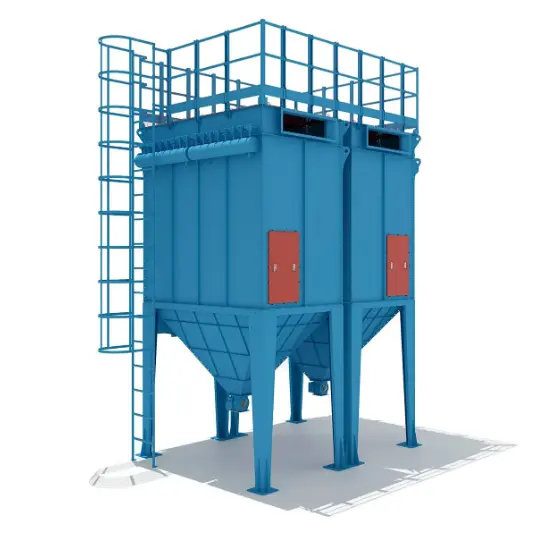Industrial operations, from cement plants to metal fabrication facilities, generate significant amounts of airborne particles during production. Without proper filtration, these particles not only harm worker health but also impact the efficiency of machinery and compliance with environmental standards. One of the most effective solutions for addressing this challenge is the baghouse dust collector, a filtration system specifically designed to capture fine dust particles and maintain cleaner air in large-scale manufacturing environments.
The Importance of Industrial Air Filtration
Airborne dust in industrial settings is not a minor inconvenience—it is a critical concern that directly influences:
- Worker health and safety: Continuous exposure to particulate matter can cause respiratory problems, skin irritation, and long-term occupational diseases.
- Equipment performance: Accumulated dust can shorten machinery lifespan and increase maintenance costs.
- Regulatory compliance: Environmental protection agencies enforce strict emission limits; failing to comply may lead to fines and production shutdowns.
- Operational efficiency: A cleaner work environment enhances productivity by reducing unplanned downtime and improving air quality within facilities.
Given these factors, industries worldwide are investing in advanced dust filtration systems to meet both operational and regulatory demands.
What Is a Baghouse Dust Collector?
A baghouse dust collector is an industrial filtration system that uses fabric filter bags to trap airborne particles. As dusty air passes through the filters, the fine particles are captured on the fabric surface while clean air is released back into the facility or atmosphere.
Key Features of Baghouse Systems
- High efficiency: Can capture up to 99.9% of fine particles.
- Versatility: Suitable for a wide range of industries, including cement, steel, power generation, and food processing.
- Durability: Designed to withstand high temperatures and heavy dust loads.
- Customizability: Available in different sizes and configurations to match specific operational requirements.
These qualities make baghouse filters one of the most reliable and widely adopted industrial air cleaning technologies.
How a Baghouse Dust Collector Works
The process inside a baghouse is both simple and effective:
- Dust-laden air enters the collector.
- Air passes through fabric filter bags. Dust particles remain trapped on the fabric.
- Clean air exits the system, ensuring safer and healthier indoor and outdoor environments.
- Automatic cleaning systems periodically remove accumulated dust from the filter bags, preventing clogging and maintaining performance.
This continuous cycle ensures that industrial processes operate smoothly without interruptions caused by dust buildup.
Applications Across Industries
Baghouse filtration systems are not one-size-fits-all solutions—they are adaptable to different sectors that generate dust during production. Common applications include:
- Cement and aggregate plants: Controlling dust during crushing, grinding, and material transport.
- Metalworking and foundries: Capturing fumes and dust from welding, cutting, and melting processes.
- Food and beverage manufacturing: Ensuring product purity by eliminating airborne contaminants.
- Woodworking facilities: Collecting sawdust and fine particles to create safer workspaces.
- Power plants: Managing ash and particulate emissions from combustion.
Advantages of Using Baghouse Filters
Companies that invest in advanced baghouse technology benefit from several advantages:
- Extended equipment life: By reducing dust accumulation on machinery.
- Energy efficiency: Improved airflow reduces energy consumption.
- Worker well-being: Cleaner air translates into healthier employees and lower absenteeism.
- Environmental responsibility: Supports corporate sustainability goals by lowering emissions.
- Long-term cost savings: Reduced fines, less downtime, and longer equipment life deliver financial benefits.
Choosing the Right Baghouse Dust Collector
When selecting a system, decision-makers should evaluate several factors:
- Dust type and particle size: Determines the type of filter bags required.
- Airflow volume: Ensures the system can handle the facility’s dust load.
- Operating temperature: Filters must withstand process heat.
- Space availability: The footprint of the baghouse must fit within the facility layout.
- Maintenance requirements: Automated cleaning systems reduce manual intervention.
Collaborating with a manufacturer that specializes in custom filtration solutions ensures that each system is optimized for specific industrial needs.
Innovations in Baghouse Filtration Technology
The latest advancements in dust collection technology continue to improve performance and efficiency:
- High-performance filter fabrics with improved dust release properties.
- Smart monitoring systems that track airflow, pressure, and bag integrity in real time.
- Modular designs that allow scalability as facilities expand.
- Eco-friendly solutions that reduce energy consumption and extend filter lifespan.
These innovations not only enhance productivity but also make compliance with evolving environmental standards more attainable.
Why Partner with an Expert Manufacturer
Not all filtration systems are created equal. Industrial operators should partner with manufacturers who:
- Provide custom-engineered solutions for unique dust challenges.
- Offer durable materials that withstand demanding operating conditions.
- Deliver technical expertise and ongoing support.
- Ensure compliance with local and international regulations.
A trusted supplier ensures that your investment delivers consistent performance, reliability, and value over time.
Conclusion
Industrial dust control is no longer an optional investment—it is a necessity for protecting workers, equipment, and the environment. Among available solutions, the baghouse dust collector remains the most effective and versatile option for large-scale industrial operations. By implementing advanced filtration systems, companies not only safeguard their workforce but also achieve operational efficiency and regulatory compliance.
Cleaner air leads to better business outcomes. With the right baghouse filtration system in place, industries can continue to grow while meeting the highest standards of health, safety, and environmental responsibility.
Also Read-
- Why Tech-Savvy Designers Are Turning to Virtual Tools for Better Results
- How Business Planning Consultants Help Startups Succeed
- BDG Win – Fast, Secure, and User-Friendly








